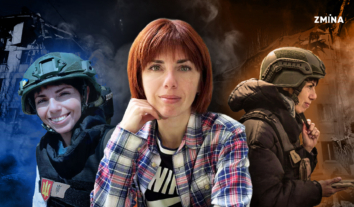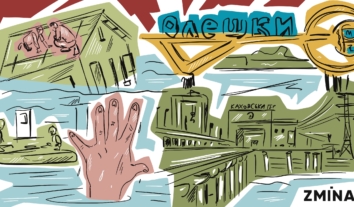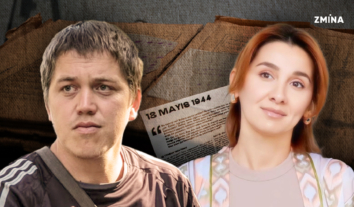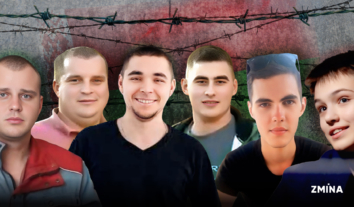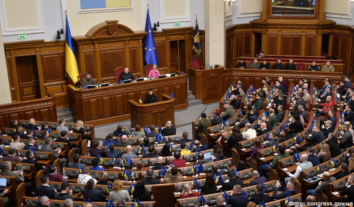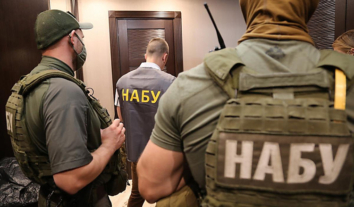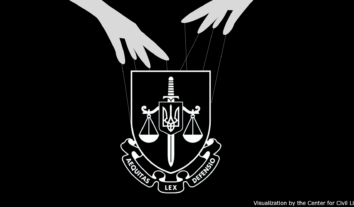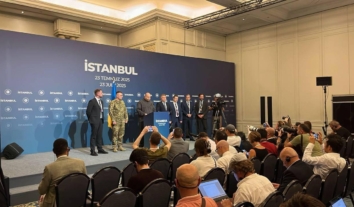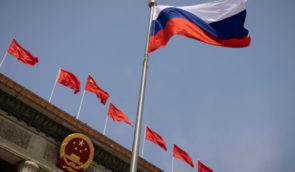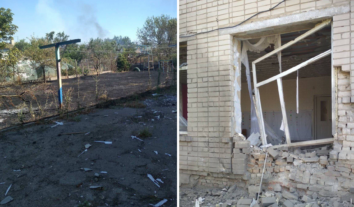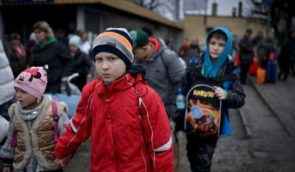‘I recognized his cross and teeth, waited for DNA analysis results for another month’: Iryna from Chernihiv spent several weeks searching for her husband, killed in Russian strike on evacuation bus
Yevhen Lutsenko, a doctor at the Medical Center of Modern Oncology in Chernihiv, was considered missing for three months. On March 13, when the man tried to leave Chernihiv to get to his family in the village of Varva, the connection with him was lost. The man could not be found for a long time. His relatives believed in a miracle, but the DNA analysis of the body found later confirmed that Yevhen had been killed between the villages of Kolychivka and Lukashivka. The Russian military struck the bus he was traveling in with an anti-tank guided missile.
Iryna, the wife of the murdered man, told ZMINA about the weeks spent hoping that her husband had survived, searching for him, and the circumstances of the Russian war crime.
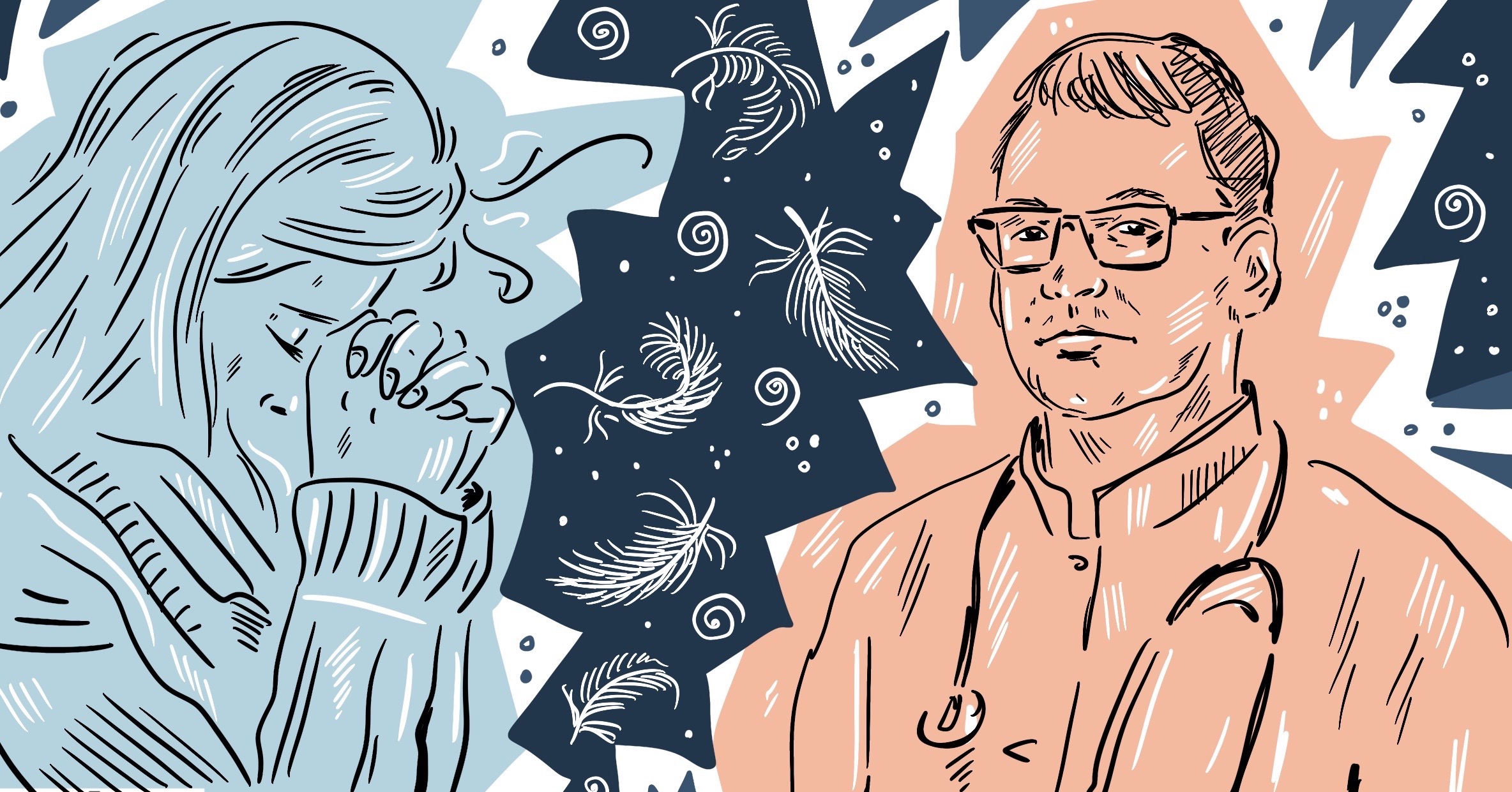 Illustrator: Tetiana Hushchyna
Illustrator: Tetiana HushchynaHappy life
Yevhen Lutsenko was one of those who chose his profession from childhood. His family likes to tell that the boy “performed surgery” on a frog in the garden at the age of four. Therefore, no one was surprised when Yevhen entered the Vinnytsia National Medical University. He didn’t just love medicine, he adored it. At the university, he met his future wife, Iryna, who was studying to become a pharmacist.
In 2016, by appointment after graduation, Yevhen arrived in his native Chernihiv region, underwent an internship, then got a job at the Chernihiv Medical Center of Modern Oncology as a thoracic surgeonі . He was interested in long complicated surgeries with a significant amount of surgical effort. Patients with concomitant diseases were sent to the Center from all over Ukraine, so the treatment required a lot of time and attention.
“Once we tried to rescue a man after coronavirus, we looked for specialized British researhes, randomized trials of special antibiotics. You study the flora, you want to get there, but it is resistant in most patients. Really, it’s very interesting, but it’s very difficult physically,” Iryna Lutsenko, Yevhen’s wife, recalls exciting professional cases.
In 2018, they got married. The couple bought an apartment, began to make repairs. A son was born, they named him Kolia. In the last six months before the war, the family felt that life had begun to improve. The doctors’ salaries were just raised. Yevhen began to perform more complicated surgeries, and Iryna actively developed her medical blog. Happy life lasted until February 24.
“We felt danger even earlier. We packed the bags, had an action plan. We understood that there would be [a war], but we didn’t admit that till the last moment,” the woman says.
Decision to stay at hospital
On February 21, after putting little Kolia to bed, the husband and the wife listened to Vladimir Putin’s speech about Ukraine, during which he recognized the sovereignty of the so-called “LPR/DPR”. Then Iryna suggested that she and the child would go to Yevhen’s parents in the village of Varva, located in the south of the region. That’s what they decided. They packed their things, throwing spring clothes into the bag as well. They called Yevhen’s father the same evening, he excused himself from work and took his daughter-in-law and grandson to his place the next day. To play it safe. They planned that Yevhen would come to them on Friday.
The morning of February 24 could have been ordinary for Iryna – no explosions were heard in the village, and she woke up calmly with her son. She went to the kitchen. Yevhen’s mother already knew that a full-scale war had begun – she hugged her daughter-in-law and said that Kyiv and Kharkiv were being shelled. When Iryna called her husband at 7 a.m., he was at work. Despite the agreement that Yevhen would come to his parents’ house, everything turned out differently. After the working meeting, the doctor decided to stay in the city.
“At 9 a.m., we were ready to go for him. He called and said he was not going anywhere. They were divided into brigades and told that they would accept the sick and injured. No persuasion worked.”
Iryna says that only Yevhen, a young radiation therapist, and nurses remained at the hospital by the evening of the same day. All other doctors went to their families. The division did not work.
The Medical Center of Modern Oncology is located in the north of the city: the shelling began almost immediately there. People flocked to the hospital’s basement. It was cold, the children started to get sick. On the phone, Iryna helped her husband calculate antibiotic doses. Yevhen gave the children his son’s toys that were in his emergency bag. The hospital quickly ran out of food, and the volunteers did not get there.
“They were given onion soup to eat. Yevhen said: ‘I eat that soup, vomit, and continue to eat.’ What was it like for me to listen to it? I understood that people were fleeing, Chernihiv was being shelled from all sides.”
Later, food was delivered. Yevhen’s family was still looking for a way to take him out. They found volunteers, two guys, who were delivering food to the military at the frontline and taking people out. On the morning of March 13, they agreed to take Yevhen out. They did not ask for money. Yevhen called Iryna and said that he was on his way to Kolychivka. The soldiers drove him from one checkpoint to the next. In Kolychivka, Yevhen got into the volunteers’ minibus and called home. For the last time.
“There should have been many people on the bus, but there were only him and an elderly woman with her grandson. Later I found out that it was not a child but an adult boy. Yevhen said that he was leaving, and we were happy, thinking that we managed to take him out. After half an hour, his phone was no longer answered. It was 17:12“.
Shelling of bus
Then there was unbearable viscous waiting. The family members checked their phones every second. The relatives assumed that Yevhen’s phone was not working, because he turned it off at the request of volunteers. It takes three to four hours to drive from Chernihiv to Varva. But the husband’s phone worked neither at 21:00 nor 02:00. At night, the family called the volunteers and heard something alarming:
“This is not a phone conversation, come in the morning.”
As soon as the curfew ended, the parents went to them. Iryna stayed at home with the child. The volunteers said that their bus had been shelled by the Russian military a few kilometers from Kolychivka.
“They said that it happened between Kolychivka and Lukashivka, on a field road. They said an anti-tank guided missile hit the bus, and they jumped out alive, unharmed. They took the wrong road that day. There had been constant shelling since March 9. I talked to them, I wanted the truth. They did not say why they chose that road.”
It turned out that the boy who was traveling with his grandmother also survived. He got eye injuries in the shelling, but he was able to reach the positions of the Armed Forces of Ukraine. Later, his relatives found him at the Chernihiv hospital. The elderly woman and Yevhen went missing.
According to Iryna, the volunteers changed the story several times. They advised the family to pray and believe in God. Iryna also talked to the relatives of the missing woman: they believed that she and Yevhen got burnt on the bus. The drivers did not voice such an option.
Two days after her husband had gone missing, Iryna went to the police in Varva. The police station was closed. She had to knock on the door, kick it with legs, call friends so that they would open the station, and accept a missing person report. But in fact, the law enforcement officers did not conduct an investigation: it was impossible to get to the tragedy scene until the region was liberated. Volunteers also filed a report, even earlier, on the shooting of a vehicle. The cases were combined into one and classified under Part 2 of Article 438 of the Criminal Code of Ukraine (“Violation of the laws and customs of war, combined with premeditated murder”).
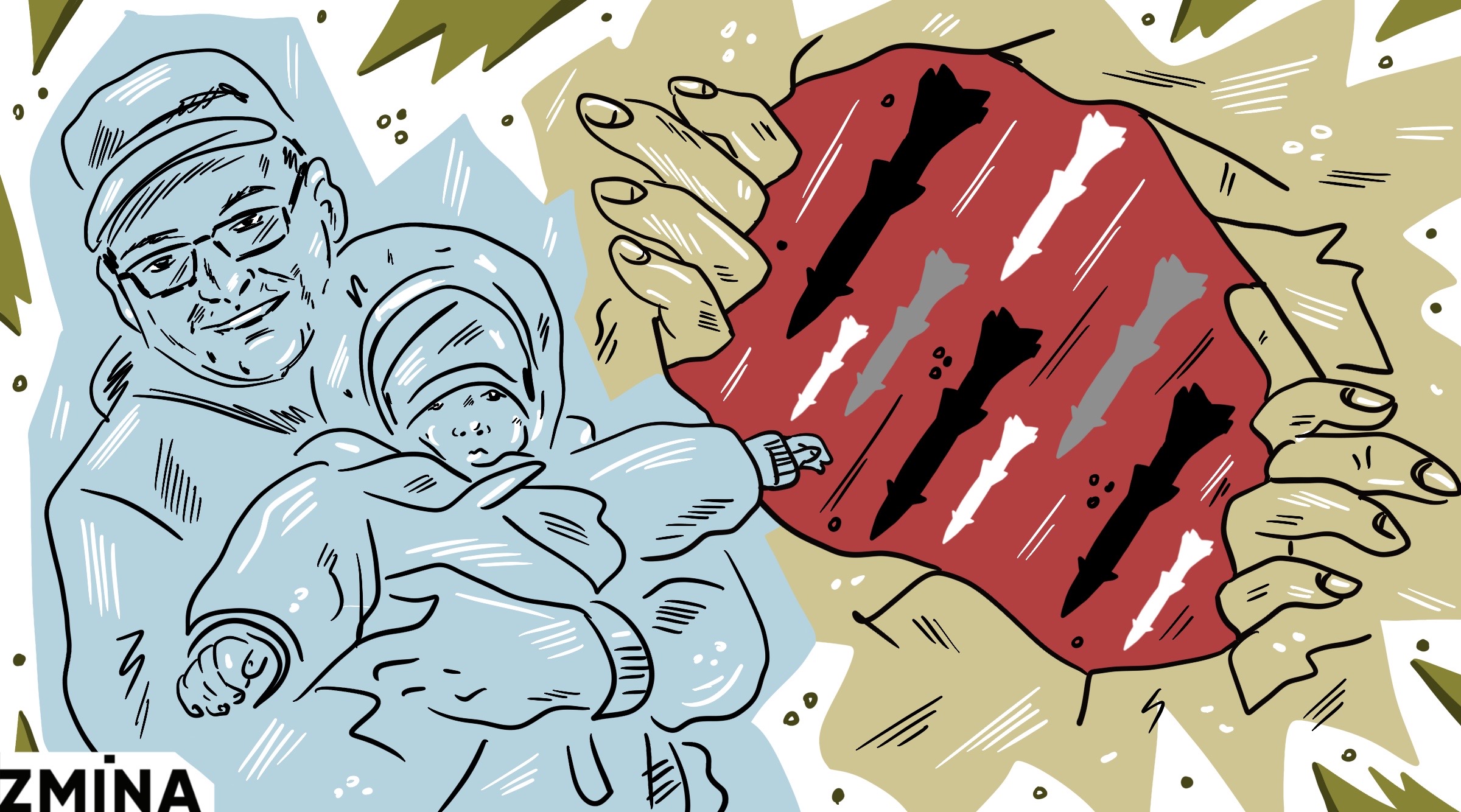 Illustrator: Tetiana Hushchyna
Illustrator: Tetiana HushchynaVain hopes
All this time, Yevhen’s family was restless. Hope appeared from time to time. First, someone said that a thoracic surgeon was being taken to a local hospital in Varva. Iryna and his parents went there in the middle of the night, but the announcement was not confirmed. Then various people started sending the woman notifications that Yevhen Lutsenko was held in captivity. It turned out the man was his full namesake.
At the beginning of April, the Armed Forces of Ukraine liberated Lukashivka, and a video of a shelled bus appeared on the Internet. It was completely burned down. Iryna shows the photo: a vehicle stands still by the road. The woman believes that the drivers, seeing the danger, simply jumped out of the bus and ran away. Instead, the passengers got trapped. But Iryna is most confused by the fact that the drivers did not immediately say that the passengers had died. Yevhen’s family would not suffer from vain hopes then.
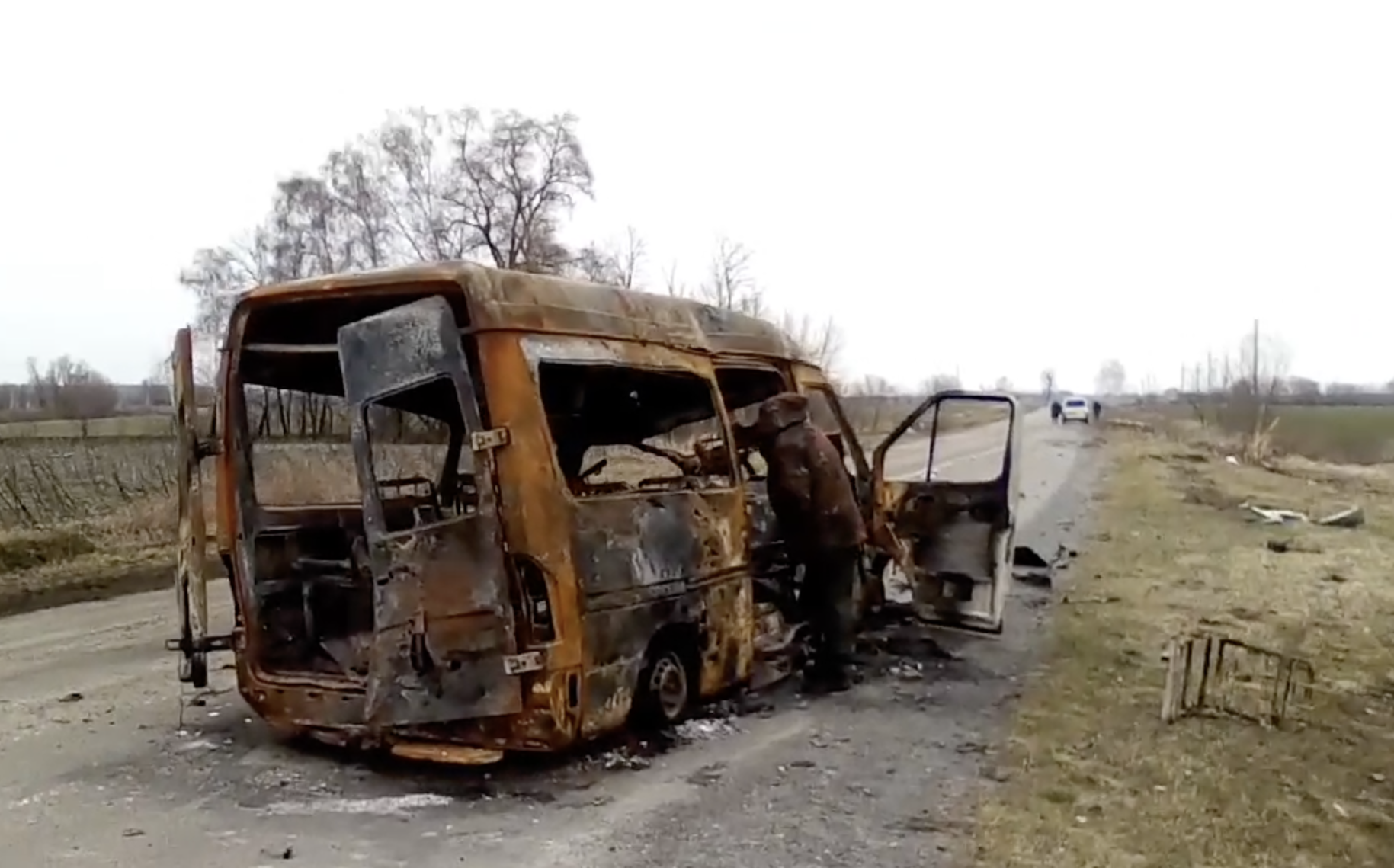 Screenshot from a video recorded by Ukrainian military
Screenshot from a video recorded by Ukrainian militaryYana Borshch, the head of the NGO “Volunteer Shield 4.5.0” who coordinated volunteers and contacted Yevhen on the day of the tragedy, explains: the drivers were injured during the shelling and still chastise themselves for not saving people.
“You can understand them, these two guys were one step away from death. They both were injured. When they were asked what had happened, they had a concussion. This may have contributed to some of the disagreements. They were not sure whether Yevhen was alive or not. They thought that some people might have dragged him away,” the volunteer says.
According to her, at that time no one dared to go to Kolychivka and take people out of there. But the elderly woman could not go out or leave on her own, so the volunteers took a risk and went to pick her up. Yevhen’s relatives also repeatedly appealed to volunteers, so they were all taken away that day.
“The volunteers were in a state of shock, reproaching themselves for not being able to take these people out. At that time, we undertook such a mission – to at least somehow help people – but it happened the way it happened,” Borshch says.
Long wait and DNA analysis
When Chernihiv region was liberated, Iryna asked an acquaintance from the Armed Forces of Ukraine to go and see the burned bus. The serviceman said that there were no bodies there. Iryna again received a small hope. Later, however, it turned out that at the end of March, under fire, the police took all the corpses from that place to the Chernihiv morgue.
“They took away all the bodies that were there – from 15 shot cars. Nothing was documented, and the police did not record whom they took from which vehicle. Then an investigator began to send photos of corpses: heads, arms, legs, wallets for bodies to be recognized“.
Iryna knew that her husband was not among them. Until they found a completely charred body with a chain and a cross. Such as Yevhen had.
“I looked at the photo but it was incomprehensible. I say: ‘Wash it and then send’ They washed it, sent a photo. I understood that was his cross.”
At first, neither Iryna nor his parents wanted to believe and acknowledge Yevhen’s death. But the next day, after looking at the photos again, they agreed that it was him. Then Iryna begged the investigator to show her photos of the remains, the police did not want to show them.
“The body was obviously burnt, but it was preserved. However, it was moved in a cloth, so his arms and legs were broken. I recognized the teeth.”
In addition, Yevhen’s knife, which he always carried with him in a bag over his shoulder, was found in the burned-out bus.
They waited another month for DNA analysis result: a long queue formed as there were dozens of unidentified bodies. It was also possible to speed up the process through acquaintances, and in the end, the result came: it was Yevhen. It was at this time that a rocket hit a military training center in Desna. The family had to wait for Yevhen’s body for another month due to a large number of victims.
“‘We have to hand over the decomposing bodies, and you will wait,’ the morgue staff said. This waiting is hell on earth,” Iryna says.
Later, the family finally draw up all the documents and buried Yevhen. The relatives did not look at the body. The farewell was difficult.
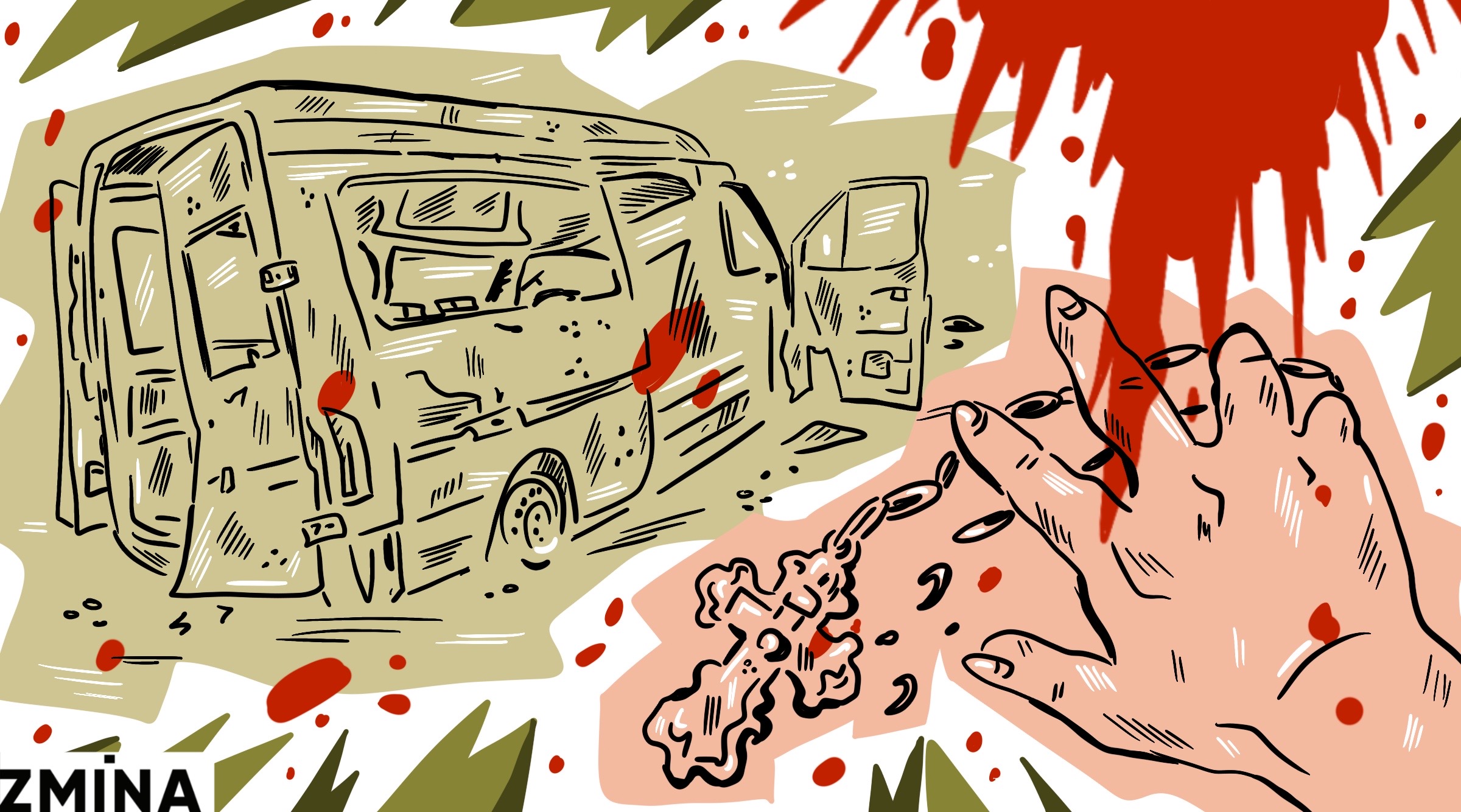 Illustrator: Tetiana Hushchyna
Illustrator: Tetiana HushchynaForced new life
After everything that happened, Iryna moved to Uman. She found a job here, works in a pharmacy. Her mother, grandmother, and son live in the village nearby. With a two-by-two work schedule, Iryna constantly visits them. She continues to run her blog: it is an opportunity for her to fulfill her creative potential, the ability to be useful to people, and additional income. The woman is not going to return to Chernihiv. It is difficult for her to live in an apartment where she and her husband were once happy.
The audience of Iryna’s blog is smart people who are looking for useful information. Thanks to the blog, the woman met many doctors who stick to evidence-based medicine, support and understand Iryna.
Iryna works at the pharmacy from 08:00 to 20:00. She tutors several doctors in pharmacology, records lectures, writes guides, and is constantly busy with work that distracts at least a little.
Iryna speaks about her husband with warmth and respect:
“He was a very smart person, I admired him. I like to know a lot, and he knew even more than I did. It spurred; we had a sort of competition. He supported my blog. He saw that I started to succeed in that, let me do photo shoots,” she recalls.
Now the woman is forced to start a new life:
“It’s unusual here, but I’m getting used gradually. In fact, you need little to be happy. As practice has shown, one backpack is enough. And the best things are not things.”

